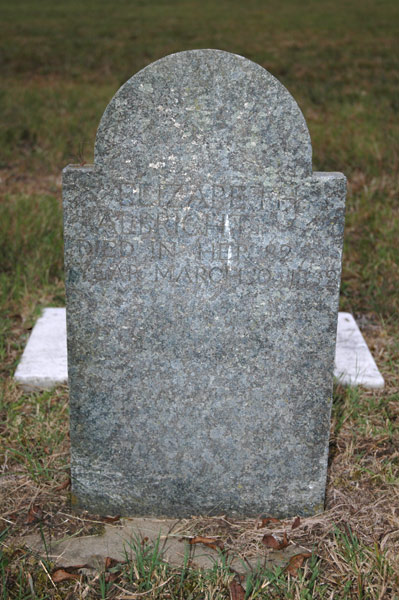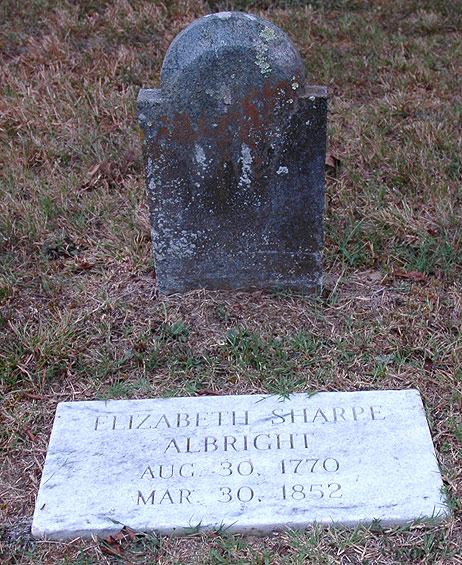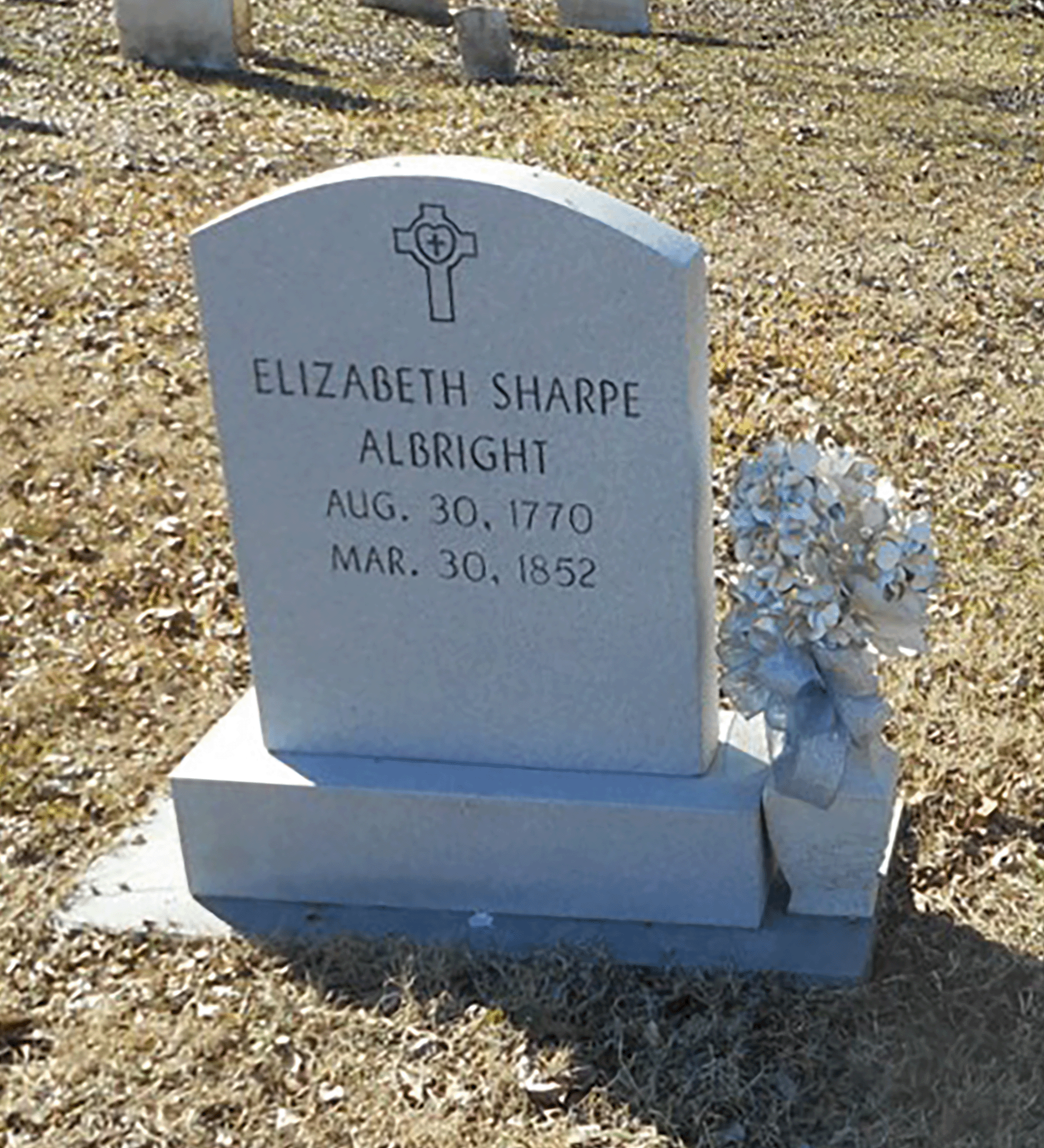Menu Items




![]()
Generation 8
Generation 1 |
Generation 2 |
Generation 3 |
Generation 4 |
Generation 5 |
Generation 6 |
Generation 7 |
Undisclosed |
Undisclosed |
Helen Marie Sharpe |
Terry Donnell Sharpe |
Mary Elizabeth Donnell |
Sarah P. Albright |
Sarah Albright |
Generation 8 |
Elizabeth Sharp |
112. Elizabeth "Betsy" Sharp (Sharpe) (Married: John Ludwick (Ludwig) Albright (#111) on 2 October 1787). This information in blue is confirmed by John's tombstone inscription and North Carolina Marriage Records, 1781-1868 for Ludwick Albright.
Born: 30 August 1770 (confirmed by tombstone) in Orange County, North Carolina of Isaac Sharpe (Sharp) Jr. (#193/223)& Maria Philopena Graves (#194/224).
Died: 30 March 1852 in Orange County, North Carolina. She is buried at St. Paulís Lutheran Church Cemetery in Alamance County, North Carolina. This was confirmed by a visit to the cemetery by Susan Snyder (#2) and her cousins Sandra Henson and Mary Lue Finch on 30 September 2005. Her tombstone is shown at the bottom of this web page.
[Her siblings included:a) Sebastian (Boston) Bostian Sharpe (Sharp) (#97) : (Married: Catharine Garrett (#98) in 1793 in Alamance County, North Carolina) Born: 30 March 1768 in Orange County North Carolina (Source of blue information: Stoners Old Meeting House Graveyard Records) [Source for the gray information is research done by Michael Cavenaugh (Glass family genealogist denoted on the Guilford County Genealogy Association Website) Died: 22 October 1846 in Orange County, North Carolina,
b) Philipena (Philopena) Sharpe: Born: 1772 in Orange County, N. C. Died: 1850 Hagerstown, Wayne County, Indiana ;
c) John Sharp: (Married: Catherine Albright [Note: Catherine was the sister of Henry Albright (#99) and Daniel Albright (#109)]) Born: About 1765 Died: Unknown in N. C. ;
d) Peter Sharp: (Married: Eve (Evelyn) Moser on 31 August 1795 in Orange County, North Carolina) Born: About 1775. Died: 13 July 1847 in North Carolina; he is buried in St. Paul's Lutheran Church Cemetery, Alamance County, North Carolina; [Source for the gray information is research done by Michael Cavenaugh (Glass family genealogist denoted on the Guilford County Genealogy Association Website]
e) Christian Sharpe (Sharp): (Married: Anna Barbara Clapp of Jabob County, North Carolina) Born: 5 October 1778 in Orange County, N. C. Died: 15 April 1861 in Orange County, N. C.; he is buried with his wife at Stoners Church Cemetery in Alamance County, N. C., A picture of his tombstone was taken by Susan Snyder (#2) on 30 September 2005;
f) Henry Sharp: (Married: Lizzie Moser) Born: ? Died: ?]
Miscellaneous:Elizabeth's brother was Sebastian (Boston) Bostian Sharpe (Sharp) (#97), a G-G-G-G Grandfather of the webmaster.
Information about Elizabeth's husband: According to North America, Family Histories, 1500 - 2000 for John Albright, published in Daughters of the American Revolution Lineage Book of the Charter Members of the DAR Vol 053, Mrs. Clara Albright Chambers, born in Guilford County, N.C., Great Granddaughter of John Albright and Elizabeth stated, "John (1761-1816) enlisted 1782, at the age of twenty-one years serving in the North Carolina troops and was discharged by the commander-in-chief at the close of the war. He died in Orange County, N.C. [Note: According to the pension application filed by Elizabeth, Ludwick began serving in the Revolutionary War in 1780 and fought in the Battle of Guilford Court House and in the Battle of Lindsey’s Mill. Both of these battles took place in 1781, so he enlisted before 1782.The pension application is shown later on this web page. ] The National Society of the Daughters of the American Revolution Lineage Books Record 138,865. DAR ID Number: 163177 states: "John Albright (1761-1816) served as private in the North Carolina troops. He died in Orange County, N.C." [Note: Elizabeth was only ~11 when her future husband began serving in the Revolutionary War. They married six years later.]
To see the U.S. Revolutionary War Pension and Bounty Land Warrent Application made by Elizabeth, click here.
Below: ~1840 Pension Application by Elizabeth Albright for service of of Ludwick Albright, Natl Archives Microseries M804, Roll 24, Application #W5609.Transcribed and annotated by Nancy Poquette.
Elizabeth Albright, widow, a resident of Orange County, NC, aged 70 years:
“…She has reason to believe, and does believe that, in the winter or spring of the
year 1780 [this corresponds with the dates in Heitman], that there was a call for a tour of
militia service in behalf of the United States, for three months. That the object of this
draft as this declarant has understood, was to aid the Southern Army under General
LINCOLN. That at the commencement of this tour, O’NEAL was the captain of the
company to which her husband was attached, TROUSDALE was lieutenant and
WILLIAM LYTLE Colonel. They were marched off to the City of Charleston in South
Carolina, but before reaching that place, O’NEAL was made major, and TROUSDALE,
captain. That under these officers her deceased husband, with others, was marched into
Charleston and engaged in fortifying that city against the enemy [29th March to 12th
May, 1780, per Heitman], and according to the best of her recollection and from the
testimony furnished by the affiant, JOHN EFLAND, marked A and hereto annexed. This
declarant has reason to believe that in this tour her husband as private of militia in the
company aforesaid, did serve the United States four months or thereabouts.”
“That at the expiration of this tour, this declarant has always understood, that her
husband served all of the aforesaid tour and was duly discharged therefrom by Captain
TROUSDALE, and returned home. That she has caused search to be made for discharges
but cannot find any.”
“That her husband, the aforesaid LUDWICK ALBRIGHT died in 1816, when all
his papers passed into the hands of his executors, and this declarant does not at this
distant day know anything of them; none were ever returned to her, that she remembers
of. See also affidavit B.”
“This declarant has reason to believe and does believe, that in the winter of 1781,
her deceased husband, the aforesaid LUDWICK ALBRIGHT, did volunteer as private of
militia in the United States service and was attached to TROUSDALE’s company.
HUGH TINNEN was Colonel. This deponent, as well as she remembers, her husband’s
statement corresponds with that of the affiant WILLIAM ALLEN, whose affidavit is
hereto annexed and marked C.”
“Said tour as well as this declarant is informed, commenced on or about the 1st
day of February 1781, and was of three months duration. In this tour, her husband was in
the Battle at the Guilford Courthouse [per Heitman, March 15, 1781], and at the
expiration of said tour, was duly discharged, as she has heard him say, and returned
home.”
“And the said Elizabeth Albright further states upon her said oath that she has
reason to believe, and does believe, that in the summer of the year of 1781, there was a
draft for militia men to serve a three months tour of duty, when her deceased husband, the
aforesaid LUDWICK ALBRIGHT was drafted for said tour. In this tour, WILLIAM
GWINN was Captain, O’NEAL-Major, and JNO. BUTLER-Brigadier General. My
deceased husband in this tour was under ROBERT MEBANE as Colonel, part of the tour,
and was in the engagement at Lindley Mills [per Heitman, September 13, 1781], in the
month of September, of the aforesaid year of 1781. That at the expiration of said tour,
which was of three months duration, my deceased husband was duly discharged by
Captain GWINN and returned home. This tour is proven by the affiant JOHN
STRADER, whose affidavit is hereto annexed and marked D.”
“And the said declarant further stateth upon her said oath that she has reason to
believe and does believe that in the fall of 1782, her deceased husband volunteered as a
private of infantry for a three months tour of duty in the militia in the United States
service. See affidavit E.”
“That ROGERS was Captain of the company to which her husband was attached
and O’NEAL- Colonel. That in this tour she has understood from her deceased husband
that said troops were marched to Sandy Creek in Randolph County; to Drowning
Creek on Pee Dee, where they were stationed some weeks; thence to the Barracks at
Litterell’s Wine? or Whine?. Their three months expired and they returned home, having
been duly discharged, as she has heard her husband say, but by what officer does not now
remember. That in this tour, as in the former, her husband was in legally organized corps
and called into service by competent authority.”
“That from the best information she possesses (derived from her husband and
others) she has reason to believe that as a private of militia in the United States service,
her deceased husband did serve the United States in the War of the Revolution, twelve or
thirteen months in legally organized corps. That in one tour, this declarant remembers of
seeing the said LUDWICK ALBRIGHT as a private soldier in the United States service,
pass by her father’s, in Captain ROGER’s company. This declarant was at that time not
above 10 or 12 years of age. Said LUDWICK ALBRIGHT lived in the same
neighborhood with this declarant’s father and were intimately acquainted. See affidavit
marked E…etc.”
[Deleted are the family-related items, which do not pertain to actual service…
about three pages.]
…“State of North Carolina, Orange County-On this 8th day of December, 1841,
personally appeared before the undersigned acting justice of the peace, in and for the
county of Orange: aforesaid THOMAS BIPPY a resident of said county, aged 77 years,
who being first duly sworn according to law, maketh oath that he was acquainted with the
late LUDWICK ALBRIGHT of the aforesaid county.”
“Deponent states that he knew LUDWICK ALBRIGHT. That when the soldier
left the Guilford Battle [per Heitman, March 15, 1781] and rendezvoused at Ramsour’s
Mill in Chatham County, he then became acquainted with LUDWICK ALBRIGHT.
They then marched to Wake Courthouse and there they stayed until they received their
discharge and come home. Together it was a three months tour. He [ALBRIGHT] did not
serve as cook in this tour, but served as a militia man under the command of General
BUTLER…”
…“B- On the 25th day of November, 1839, personally appeared before the
undersigned, [etc], LUDWICK MAY, a resident of Orange County, aged about 77
years…maketh oath that he was acquainted with the late LUDWICK ALBRIGHT...The
said witness states on oath that he was known to LUDWICK ALBRIGHT being a soldier
in the Revolutionary War. His Captain was GWINN, O’NEAL was his Colonel. He
cannot testify the length of time he served. And further this deponent saith not.”
“C-On this, the 4th day of February 1840, personally appeared [etc], WILLIAM
ALLEN, a resident of the county of Orange, aged 76 years, who [etc] saith that on or
about the 1st of February 1781, he volunteered and did serve a three months tour of duty
in the militia, in the United States service and that said tour ended on or about the first of
May ensuing. That in this tour, this deponent remembers that LUDWICK ALBRIGHT of
the County of Guilford in the state aforesaid, was a private of militia in the United States
service in said tour with us.”
“This deponent remembers the said LUDWICK ALBRIGHT very well. He was
noted in the camp for his great activity. This deponent is under the impression that said
ALBRIGHT was in the same “mess” with him part of the tour, and further saith not.”
“E-On this, the 26th day of February, 1840, personally appeared [etc],
BARNABAS CLAPP, a resident of [Orange] County, aged 76…saith that in the War of
the Revolution as a private soldier in the militia, he served a tour of duty in the fall of
1782 (as well as the deponent remembers), and that in said tour, this deponent remembers
of LUDWICK ALBRIGHT of the aforesaid county as a private in the militia in said tour,
and thinks that said LUDWICK ALBRIGHT was in Captain ROGER’s company and
attached to Colonel O’NEAL’s regiment.”
“This deponent is under the impression he has seen the aforesaid ALBRIGHT out
in other tours in the militia, but does not remember them well enough to particularize,
and further the deponent saith not.”
“A- On this 7th day of March, 1840, personally appeared…John EFLAND a
resident of [Orange] County, aged 77 years, who…maketh oath that in the War of the
Revolution, he served the United States in several tours as private of militia.”
“This deponent further states…that he was intimately acquainted with LUDWICK
ALBRIGHT from his boyhood till the death of said ALBRIGHT. That in the War of the
Revolution, said ALBRIGHT was a good Whig, and this deponent remembers that in the
winter and spring of 1780, he volunteered as a private in the United States service for a
three months tour. When we were marched to the south, William O’NEAL was Captain,
TROUSDALE was Lieutenant, LYTLE-Colonel. O’NEAL returned home before we
marched [to] Charleston in South Carolina. Lay some weeks within 3 or 4 miles of
Charleston, when O’NEAL joined us and had the commission of Major. TROUSDALE
was now made Captain of our company and CAMPBELL was Lieutenant. Was marched
into Charleston and was kept in the service about four months as well as he now
remembers (in his declaration for pension, this deponent may have stated his tour with
more accuracy than at the present day), to which, please refer.”
“In all of which tour, this deponent remembers that the aforesaid LUDWICK
ALBRIGHT of the aforesaid county, now deceased, was a private of infantry in all of
said tour, etc.”
“On the 28th day of March 1840, personally appeared [etc], JOHN STRADER, a
resident of Orange [County] and a U.S. pensioner, aged 82 years…maketh oath that he
was very well acquainted with the late LUDWICK ALBRIGHT…”
“The deponent, as a private soldier in the summer of 1781, was drafted into the
United States service for a three months tour. GWINN was Captain, O’NEAL was major,
BUTLER-Brigadier General (militia). Rendezvoused at O’NEAL’s, in this tour was in
the engagement at Lindley’s Mills [September 13, 1781, per Heitman]. In all of this
three months tour, said LUDWICK ALBRIGHT as a private soldier did serve all of said
three months tour in said company and were all discharged at Colonel O’NEAL’s at the
end of said tour.”
“This deponent does not remember that said LUDWICK ALBRIGHT served in
any other tour with him, that he now remembers, but has understood from said
LUDWICK ALBRIGHT and others that said ALBRIGHT was in a tour in South
Carolina just before the surrender of Charleston in 1780.”
“Said ALBRIGHT had the reputation of being a good Whig and much in the
United States service in the War of the Revolution.
The 1790 U.S. Census Search Results show that two Ludwick Albrights were living in Orange County, North Carolina. They are accounted for on roll M637_7. One of these Ludwicks could be #111. The other could be his father, # 221. [Note: Since Elizabeth married John Ludwick Albright in 1787, she would have been living with Ludwick at the time of this census. She would have been 20 years of age.]
The 1800 Orange County, North Carolina census for John Ludwig Albright lists 2 males 0-10 years of age ( Isaac-age 3, Daniel-age 8); 2 males 10 to 16 (George-age 12, John l. - age 15), 1 male 26 to 45 (John Ludwig-age 39), 2 females 0 to 10 (Barbara-age 1, Elizabeth- age 6); 1 female 10 to 16 (Mary-age 10), and 1 female 26 to 45 (Elizabeth Sharp-age 30 years). Three children were born after the 1800 census: Martha (1802), Sarah (1804) and Ludwig (1806). (Source of purple: Ancestry of Albright and Holt Families of Clay County, Missouri Book 2,1984, p. 294; Compiled by Claribel Albright McClain, great granddaughter of Daniel Albright and Amelia Holt.)
In Land Grant Records of North Carolina, Volume I Orange County 1752-1885 by Pat Shaw Baily, 1990, there are files for George Albright (could be John Ludwick Albright’s brother or his cousin, the brother of 99 and 109), Jacob (could be John Ludwick Albright’s brother or cousin and #99’s and 109’s brother), John Albright (could be John Ludwick Albright or his brother or cousin and #99’s and 109’s brother), and Lodowick Albright (could be John Ludwick Albright (#111) or his father Ludwick (Ludwig) (Lodowick) Albright) (#221) . The issue dates of the land grants range from 1779 and 1810. Much of the land was granted to these men along Gun Creek, Haw River, Rock Creek, and the Great Allemance. [Note: John Ludwick Albright's will (dated 1816) designates that his lands along the Alamance will go to his sons Isaac and Ludwick and that that is where the family lives. Other land had already been given to his sons John, George, and Daniel, but there is no description of the location of those lands in the will].
Elizabeth Sharp Albright and John Ludwick Albright had 9 children: George, Mary, Daniel, Elizabeth, Isaac, Barbara, Martha, Sarah (#56), and Ludwick. [Note: All of the children are mentioned in John's will].
The children of John Ludwick (Ludwig) Albright (#111) & Elizabeth are also listed in Elizabeth's pension application W 5609. This information is documented in an abstract of Revolutionary War Pensions, The North Carolinian, Vol VII, No. 2, Mar., 1961, p. 777." (Source of purple: Ancestry of Albright and Holt Families of Clay County, Missouri Book 2,1984, p. 293; Compiled by Claribel Albright McClain, great granddaughter of Daniel Albright and Amelia Holt.) [Note: In 1840, at the age of 70 years, Elizabeth applied for the pension for her deceased husband's service. The details were already described above.]
In the 1850 census in Guilford County, Elizabeth was living in the household of her daughter Martha and son-in-law George Albright, who was the son of Daniel A. Albright (Albrecht) (#109) & Catharine (Catherine) "Katie" (Katy) Loy (#110). (Source of purple: Ancestry of Albright and Holt Families of Clay County, Missouri Book 2,1984, p. 294; Compiled by Claribel Albright McClain, great granddaughter of Daniel Albright and Amelia Holt.)
Elizabeth died ~2 years after the 1850 census.
Below: Photographs of Elizabeth's tombstone at St. Paul's Lutheran Church Cemetery in Alamance County, North Carolina. (GPS: 36° 1.396 minutes N, 79° 28.689 minutes W).
Her tombstone reads:
Elizabeth
Albright
Died in HER 82
YEAR MARCH 30 1852
Below: This photograph shows the back of Elizabeth's tombstone and a newer stone. Note the spelling of Elizabeth's middle name "Sharpe". John's tombstone spells it "Sharp."
Below: This photograph shows Elizabeth's new tombstone, provided in 2016 by a descendent, Don Stanford. Don wanted Elizabeth's and her husband John Ludwig Albright's tombstones to match new stones that had been provided in the cemetery for others a few years earlier. [ According to James Andrews, another descendent, the original stones were placed onto a display rack (with others) inside St. Paul's Fellowship building.] (Photograph is Courtesy of Don).
Lifetime Events Summary for Elizabeth Sharp/Sharpe:
The webmaster's DNA has matched no less than 29 other members in an Elizabeth Sharp (Sharpe) DNA Circle in ancestry.com.
Contact person for this website is Susan Snyder: susanleachsnyder@gmail.com


